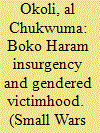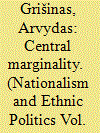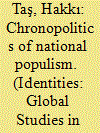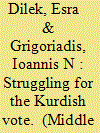|
|
|
Sort Order |
|
|
|
Items / Page
|
|
|
|
|
|
|
| Srl | Item |
| 1 |
ID:
154940


|
|
|
|
|
| Summary/Abstract |
A strong sense of victimhood, a discourse of social suffering, and complementary bodily performances, which mobilize rancor, resentfulness, and revengefulness, are fundamental elements of Turkish-Islamist ideology. This article discusses the political dynamics and implications of such assertions of victimhood in the Turkish context. To underscore these dynamics, it analyses the role of the logic of pain in the subject formation of Turkish-Islamist identity and how this logic has been revitalized by constitutive and hegemonic social imagination, and circulated and intensified by a reactionary mood. Additionally, it aims to expose how this reactionary mood profoundly depends on contradictory subjectification processes, which simultaneously involve mobilization of feelings of impotency, non-responsibility, self-pitying, and sublimation of power. This subject formation opens the way for identification with authoritarian figures in the Turkish case.
|
|
|
|
|
|
|
|
|
|
|
|
|
|
|
|
| 2 |
ID:
168224


|
|
|
|
|
| Summary/Abstract |
Boko Haram insurgency in North East Nigeria has exposed women (girls, ladies, and mothers) to a complex jeopardy. While some women have suffered untimely widowhood or child-lack as a result of the Boko Haram onslaught, others have suffered death, forced abduction, and allied assaults on the main and side lines of the insurgency. Oftentimes, women have faced direct violence that essentially degrade their humanity. This is evident in the deployment of women as war-front sex slaves, human shields, and suicide bombers by the insurgents. The virtual expendability of women in the context of Boko Haram insurgency has been vividly demonstrated by the gale of female suicide bombings in Nigeria over the recent years. By means of a textual and contextual analysis of library sources and/or documentary data, as well as an adroit application of the theory of objectification, this study posits that, in addition to suffering collateral vulnerabilities, women have equally been instrumentalized as objects of terror in the context of Boko Haram insurgency. The paper further argues that the ‘weaponization’ of women’s bodies as bomb vessels and human shields by the insurgents highlights the height of women’s corporal victimization and objectification in contemporary asymmetric warfare.
|
|
|
|
|
|
|
|
|
|
|
|
|
|
|
|
| 3 |
ID:
152479


|
|
|
|
|
| Summary/Abstract |
The article discusses from an anthropological point of view the reasons why minorities tend to find themselves at the center of tensions in Central-Eastern Europe. It presents an idea that the answer to the question lays in the “human side” of the regional politics. In human experiential terms, the political “character” of the region and the image of ethnic minorities as political phenomena are both grounded in memory of suffering and victimization. Because of the historical and experiential circumstances, it became a basis for identity formation, perpetuating the regional tensions. However, such victimized identity can be hijacked and abused both by the actors themselves and the external forces.
|
|
|
|
|
|
|
|
|
|
|
|
|
|
|
|
| 4 |
ID:
184072


|
|
|
|
|
| Summary/Abstract |
Inspired by the populists’ salient urge to recalibrate and locate contingent developments within a larger temporal order and establish historical continuity, this paper dwells on the chronopolitics of national populism and calls for a systematic treatment of time in these movements. Focusing on the neglected narrative dimension, such an inquiry will afford an alternative reading from which to engage with and critique the magnitude of populism. This study argues that despite ample variance and claims of uniqueness, national populisms employ a shared temporal template that accounts for a particular national subjectivity through a set of timing and sequencing of events complemented by affective stimuli. It focuses on the case of Turkey. More pronounced since 2013 Gezi Protests, the rising tide of national populism under President Tayyip Erdoğan’s rule encapsulates how these populisms conflate the past, present, and future into a single narrative about the people’s survival and prosperity.
|
|
|
|
|
|
|
|
|
|
|
|
|
|
|
|
| 5 |
ID:
189557


|
|
|
|
|
| Summary/Abstract |
This article examines the redress campaign waged by activists in Japan on behalf of roughly 2,000 North Korean A-bomb victims (pipokja). These victims were repatriated from Japan after being subjected to the 1945 US nuclear attacks on Hiroshima and Nagasaki, while under colonial rule. From the early 1990s through to the twenty-first century, activists in Japan pursued redress for these A-bomb survivors in close synchronicity with the redress movements centred on South Korean victims. Highlighting the potential of the individual as entrepreneur within collective action settings, the redress developments were initiated and largely driven by an activist, Lee Sil-gun (1929–2020).
Although Tokyo and Pyongyang were initially reluctant to acknowledge that A-bomb survivors existed in North Korea, in the face of sustained pressure by the Japan-based activists, the two governments facilitated a limited redress process for the victims by making various concessions on the issue. How did these activists navigate the structural constraints of the authoritarian North Korean state and the volatile bilateral relationship in enacting their transnational activism? How were they able to elicit concessions on their redress objectives from Tokyo and Pyongyang in the absence of formalized diplomatic relations? Drawing on fieldwork conducted in Japan and South Korea, this article probes these questions by empirically tracing and analyzing the evolution of the redress campaign for the North Korean A-bomb victims. I utilize the concept of polylateral diplomacy to elucidate the dynamic of engagement between the activists and the two governments.
|
|
|
|
|
|
|
|
|
|
|
|
|
|
|
|
| 6 |
ID:
192539


|
|
|
|
|
| Summary/Abstract |
China remains reluctant in claiming unilateral economic sanctions as a valid form of statecraft. China has consistently withheld official acknowledgment of its use of unilateral sanctions despite using them in different disputes. This has resulted to observations arguing that China is increasingly approaching the use of sanctions in a stealthier, therefore, more aggressive manner. It begs to ask, how does China’s reluctant attitude towards its use of unilateral economic sanctions fit into China’s overall foreign policy logic? More specifically, how does China’s victimhood discourse justify unilateral sanctions and at the same time, promote a positive identity of itself in light of coercion? This paper argues that China’s consistent vague acknowledgment and denial in claiming a direct hand on unilateral sanctions comes from its broad foreign policy objective of maintaining a positive identity through its discourse of victimhood. To uncover this understanding, this paper analyzes China’s official positions in six bilateral disputes where China has resorted to unilateral sanctions. While existing observations only stop at ‘plausible deniability’ as primary explanation for China’s vague rhetoric, analyzing China’s predication strategies provides a necessary nuancing in terms of how this peculiar behavior remains consistent with China’s overall foreign policy logic.
|
|
|
|
|
|
|
|
|
|
|
|
|
|
|
|
| 7 |
ID:
187478


|
|
|
|
|
| Summary/Abstract |
This article explores how notions of conservative populism animate Turkish foreign policy. It explicates the construction of the ‘us’ and ‘them’ in conservative populism and how it became the dominant or hegemonic discourse of the AKP regime. While demonstrating various aspects of the peculiar conservative populism, the paper will try to point out the specific governmental ethos that conservative populism generates in the case of the AKP. By emphasizing how conservative populism is intermingled with Turkish-Islamist ideology, the paper explores the background of the AKP’s pro-active and assertive foreign policy as well as the devastating effects of the de-institutionalization of the bureaucratic state structure and decision-making mechanisms.
|
|
|
|
|
|
|
|
|
|
|
|
|
|
|
|
| 8 |
ID:
091580


|
|
|
|
|
| Publication |
2009.
|
| Summary/Abstract |
As rising powers, India and China are critical to regional and global stability in the twenty-first century. While most analyses of their behavior emphasize their material capabilities as an explanatory variable, this article takes into greater account the role of the past. This involves how they both operate under a "post-imperial ideology" (PII), an emphasis on colonial trauma and "victimhood," exemplified in their still unresolved territorial dispute. Using new documents, this article shows how PII led to the breakdown of the negotiations between the two sides and war in 1962. PII not only suggests a new way to think about two important rising powers today, China and India, it also offers a new way to think about states in the international system.
|
|
|
|
|
|
|
|
|
|
|
|
|
|
|
|
| 9 |
ID:
193608


|
|
|
|
|
| Summary/Abstract |
This article seeks to address a thematic thread that remains relatively unexplored in historical disaster research—victimhood—through an analysis of publications by disaster relief funds and their supporters in the aftermath of the 1934 earthquake in Bihar in northern India. By examining the representations of victimhood, I aim to explore the historical significance of perceptions and constructions of victimhood in the late colonial period. Based on photographs, illustrations, and descriptions of suffering in images and texts, the article suggests that constructions of victimhood effectively relied on imagery that contained, on the one hand, an absence of bodies and, on the other, a feminized anthropomorphization of suffering. The narratives underlying such depictions of earthquake victims are based on a constitution of victimhood that relied on contemporary historical and culturally founded imageries. The analysis of images and texts focuses on how representations of disaster victims were effective in communicating suffering to audiences. I tentatively argue that historically and culturally founded tropes of what constituted a victim formed along two narratives of victimhood that appealed to a colonial and a nationalist readership respectively. These conceptualizations of victimhood formed the basis for collecting aid for relief and reconstruction, rather than the loss of life, dispossession, social marginalization, and displacement suffered by victims of the earthquake.
|
|
|
|
|
|
|
|
|
|
|
|
|
|
|
|
| 10 |
ID:
158073


|
|
|
|
|
| Summary/Abstract |
This study explores the competition for Turkey's Kurdish vote through the instrumentalization of religion, ethnicity and victimhood in political competition. This becomes possible through the study of rally speeches of the Justice and Development Party (Adalet ve Kalkınma Partisi – AKP), the pro-Kurdish Peace and Democracy Party (Barış ve Demokrasi Partisi – BDP) and the Peoples’ Democratic Party (Halkların Demokratik Partisi – HDP), in Turkey's June 2011 and June 2015 general elections. The AKP campaigns framed the resolution of the Kurdish issue along with an updated version of the ‘Turkish Islamic Synthesis’. The issue of ethnicity was toned down in contrast to the idea of common victimhood of pious Turkish and Kurdish Muslims in republican Turkey. On the other hand, the BDP/HDP moved from a more ethnic-oriented and exclusive identity approach in 2011 to a more inclusive, liberal and extrovert agenda based on a civic definition of Turkish national identity in 2015. Religion and victimhood appear as the two most enduring symbolic resources for political party mobilization.
|
|
|
|
|
|
|
|
|
|
|
|
|
|
|
|
| 11 |
ID:
174431


|
|
|
|
|
| Summary/Abstract |
Using critical textual analysis based on the postcolonial school of thought, this essay analyzed a ten-minute segment, called “Women of the Revolution,” on the ABC news program This Week, anchored at that time by Christiane Amanpour, for its portrayals of Arab and Muslim women. The analysis showed that Arab and Muslim women were portrayed positively only when they fit a “media-darling” trope of Western-educated Arab or Muslim women, or those who looked and acted similar to Western women, especially if they ascribed to a Western view of feminism. Those women also were seen as the exception to the “repressive” culture that characterizes the Arab and Muslim worlds, according to the Orientalist stereotype. The implications of this analysis indicate that, in spite of the visibility and progress of many Arab and Muslim women in their countries and indigenous cultures, they are still framed within old recycled molds in US mainstream media, even if these seem positive at face value.
|
|
|
|
|
|
|
|
|
|
|
|
|
|
|
|
| 12 |
ID:
089206


|
|
|
|
|
| Publication |
2009.
|
| Summary/Abstract |
This article explores the representation of victimhood in political discourse and the relation between victimhood, identity, and political agency. The empirical material is drawn from the early days of the Northern Ireland conflict and covers the debate on internment that was in operation from August 1971 until December 1975. Both those supporting and those opposing internment drew on images of victimhood-images that were vital in the construction of legitimacy and political agency. First, the rendering of detailed stories of individual suffering and victimhood produced compassion and empathy-features legitimising the different approaches. Second, the construction of victimhood involved mechanisms of inclusion and exclusion, creating "we-them" dichotomies, producing "collectives of victimhood," which in many cases worked as a platform from which political agency could be voiced. And third, the construction of victimhood produced political truths. The victim was given a particular status embodying a particular moral integrity to determine the truths about "what had really happened," a status that made the victim a vital agent in the political battle for "the hearts and minds." The article stresses the importance of studying the representation of victimhood within particular historical contexts and demonstrates the complex and ambiguous effects of the representations of victimhood in violent political conflicts. The examination shows that victimhood has both humanising and dehumanising effects and, depending on the contextual framework, victimhood can create confidence, empowerment, and agency, but also disempowerment and passivity.
|
|
|
|
|
|
|
|
|
|
|
|
|
|
|
|
| 13 |
ID:
193042


|
|
|
|
|
| Summary/Abstract |
This article is an empirical examination of ‘victimhood’ in the context of the widespread, deadly and destructive electoral violence that affected Zimbabwe in 2008. It contends that an examination of the behaviour of victims of state-sponsored political violence enhances our comprehension of ‘victimhood’ as a factor in the perpetuation of political violence. The victims were largely ignored by the justice system, the political leadership and the community, all of whom were under the coercive spell of the ruling Zimbabwe African National Union-Patriotic Front (ZANU PF). The trivialisation of their situation, and the absence of legitimate avenues for redress, forced many victims to seek direct revenge. The article traces how this fomented and reproduced the already violent political atmosphere in Norton town during the 2008 election period. It relies on interviews with opposition Movement for Democratic Change (MDC) victims of violence in Norton to consider how they attempted to make sense of their pain by claiming victimhood and exacting physical revenge against their tormentors.
|
|
|
|
|
|
|
|
|
|
|
|
|
|
|
|
|
|
|
|
|